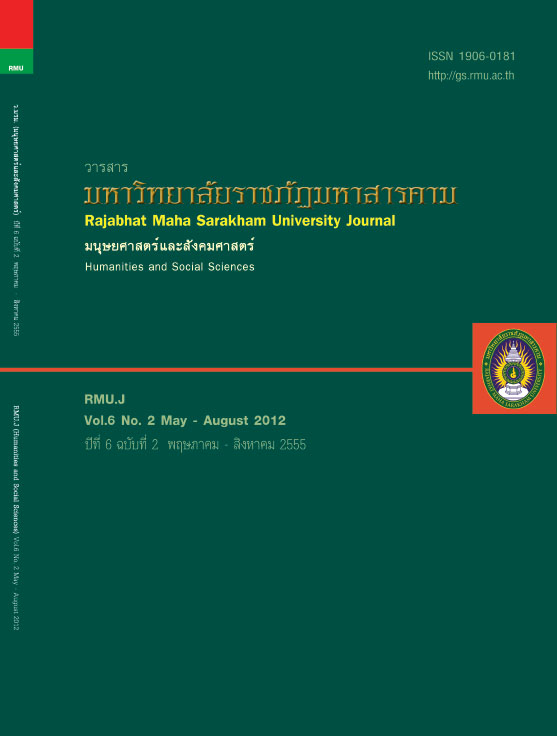ผลของการประยุกต์ใช้กระบวนการกลุ่มต่อพฤติกรรมสุขภาพของผู้สูงอายุใน ชมรมผู้สูงอายุ ตำบลหนองบัว อำแภออาจสามารถ จังหวัดร้อยเอ็ด; The Effects of Group Process Application on Health Behaviors of the Elders in Elderly Clubs in Nong Bua Sub-District, Archsamart
Main Article Content
บทคัดย่อ
การวิจัยครั้งนี้มีวัตถุประสงค์เพื่อศึกษาเปรียบเทียบพฤติกรรมสุขภาพของผู้สูงอายุ ด้านการออกกำลังกายการบริโภคอาหาร และ
ด้านความเครียด ของกลุ่มทดลองและกลุ่่มเปรียบเทียบ รูปแบบการวิจัยเป็นการวิจัยแบบกึ่งทดลอง กลุ่มตัวอย่างคือผู้สูงอายุใน
ชมรมผู้สูงอายุ ตำบลหนองบัว อำเภออาจสามารถ จังหวัดร้อยเอ็ดโดยแบ่งเป็นกลุ่มทดลอง 32 คน และกลุ่มเปรียบเทียบ 32 คน โดย
การสุ่มแบบเจาะจง ดำเนินการวิจัยระหว่างเดือนมีนาคม - มิถุนายน 2553 โดยประยุกต์ใช้กระบวนการกลุ่ม และกิจกรรม 3 ครั้ง ครั้ง
ที่ 1 ใส่กิจกรรม 6 ขั้นตอนคือ 1) ขั้นรวมกลุ่ม 2) ขั้นกำหนดจุดมุ่งหมายของกลุ่ม 3) ขั้นระดมความคิด 4) ขั้นกระชับความสัมพันธ์ 5)
ขั้นสลายตัว 6) ขั้นติดตามประเมินผล ครั้งที่ 2 กิจกรรมการติดตามประเมินผล ผู้วิจัยออกติดตามเยี่ยมบ้านเพื่อกระตุ้นและประเมิน
การมีส่วนร่วมของผู้สูงอายุในกิจกรรมด้านสุขภาพของชมรมผู้สูงอายุ สัปดาห์ละ 1 ครั้ง รวม 6 สัปดาห์ ครั้งที่ 3 กิจกรรมการจัดเวที
เสวนาแลกเปลี่ยนเรียนรู้ของกลุ่มทดลอง และเก็บข้อมูลหลังการทดลอง สถิติที่ใช้ในการวิเคราะห์ข้อมูล ได้แก่ Paired t-test และ
Independent t-test ผลการวิจัยพบว่า
ภายหลังการทดลอง ผู้สูงอายุกลุ่มทดลองมีคะแนนเฉลี่ยพฤติกรรมสุขภาพ ด้านการออกกำลังกาย และการบริโภคอาหารที่
ถูกต้องเพิ่มมากขึ้นจากก่อนการทดลองและเพิ่มมากกว่ากลุ่มเปรียบเทียบอย่างมีนัยสำคัญทางสถิติที่ระดับ .05 แต่ผู้สูงอายุในกลุ่ม
ทดลองมีคะแนนเฉลี่ยพฤติกรรมสุขภาพ ด้านความเครียดน้อยกว่าก่อนการทดลองและน้อยกว่ากลุ่มเปรียบเทียบอย่างมีนัยสำคัญ
ทางสถิติที่ระดับ .05 โดยสรุป การประยุกต์ใช้กระบวนการกลุ่มทำให้ผู้สูงอายุมีพฤติกรรมด้านสุขภาพดีขึ้น ดังนั้น ควรมีการส่งเสริม
และกระตุ้นให้มีการใช้กระบวนการกลุ่มเป็นเพื่อส่งเสริมพฤติกรรมด้านสุขภาพของผู้สูงอายุและกลุ่มอื่น ๆ ในชุมชนต่อไป
The purpose of this study was to compare the health behaviors of the elderly. The purpose of this study
was focused on exercise, food consumption and stress management of an experimental group and the
control group. Quasi-experimental design was employed for the study. The samples consisted of sixty four
elders in Nong Bau elderly club, Archsamart District, Roi Et Province. They were selected by the purposive
random sampling technique and they were divided into two groups: thirty two elders of the control group and
thirty two elders of the experimental group. The group process model with three major activities was applied
for the research during the period of March - June 2010. Six steps of the first activity consisted of: 1) grouping,
2) setting aims, 3) brainstorming, 4) strengthening relations, 5) dispersion and 6) monitoring. The second
activity consisted of visiting the elders to encourage and evaluate the participation of the elders in health
activities once a week for 6 weeks. The third activity was a group discussion of the experimental group about
health behaviors of the elders. The statistics used was paired t-test and independent t-test. The research
finding indicated that the average score of the experimental group for the health behaviors getting exercise
and food consumption after the experiment was significantly higher than before the experiment at the .05
level. However, the average score of the experimental group for the health behavior of stress management
after the experiment was significantly lower than before the experiment at the .05 level. The research findings
can be concluded that the group process model improves the health behaviors of the elders. Therefore, the
group process model should be promoted widely to other groups in community.
Article Details
1. บทความที่ลงตีพิมพ์ทุกเรื่องได้รับการตรวจทางวิชาการโดยผู้ประเมินอิสระ ผู้ทรงคุณวุฒิ (Peer Review) สาขาที่เกี่ยวข้อง อย่างน้อย 3 ท่าน ในรูปแบบ Double blind review
2. ข้อคิดเห็นใด ๆ ของบทความที่ลงตีพิมพ์ในวารสารมหาวิทยาลัยราชภัฏมหาสารคาม นี้เป็นของผู้เขียน คณะผู้จัดทำวารสารไม่จำเป็นต้องเห็นด้วย
3. กองบรรณาธิการวารสารมหาวิทยาลัยราชภัฏมหาสารคาม ไม่สงวนสิทธิ์การคัดลอกแต่ให้อ้างอิงแสดงที่มา


